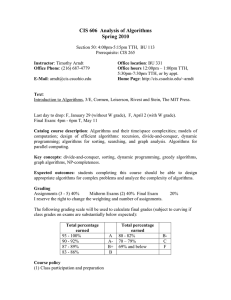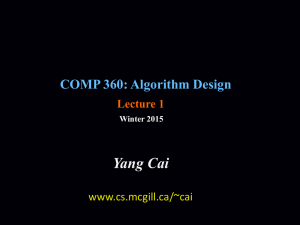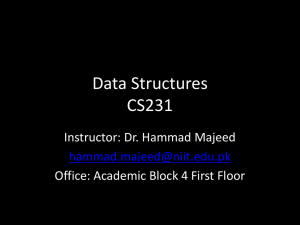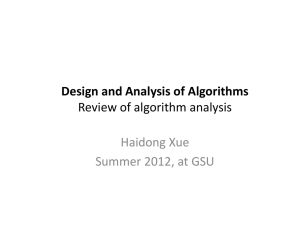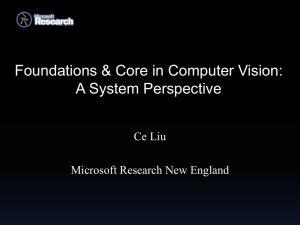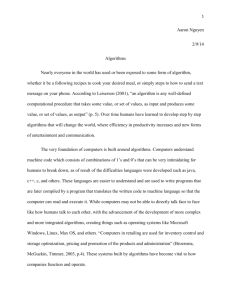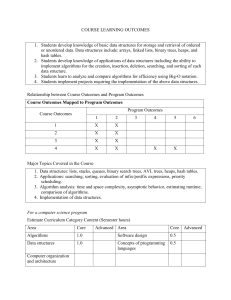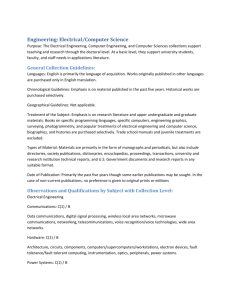CIS 260 Computer Programming I in C
advertisement
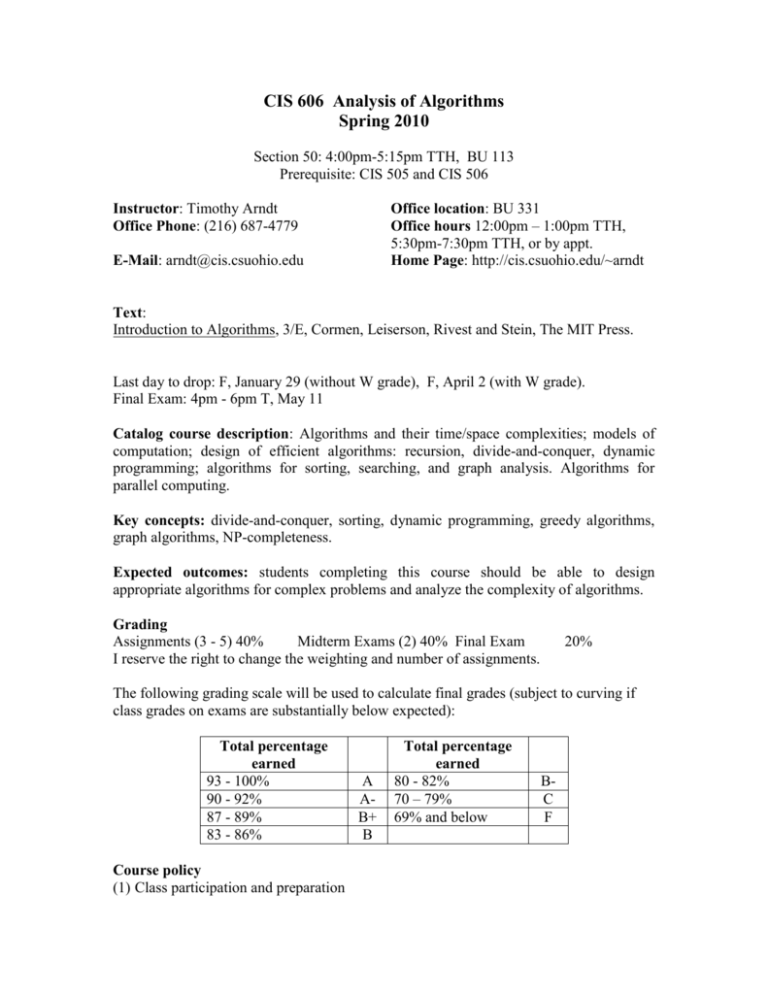
CIS 606 Analysis of Algorithms Spring 2010 Section 50: 4:00pm-5:15pm TTH, BU 113 Prerequisite: CIS 505 and CIS 506 Office location: BU 331 Office hours 12:00pm – 1:00pm TTH, 5:30pm-7:30pm TTH, or by appt. Home Page: http://cis.csuohio.edu/~arndt Instructor: Timothy Arndt Office Phone: (216) 687-4779 E-Mail: arndt@cis.csuohio.edu Text: Introduction to Algorithms, 3/E, Cormen, Leiserson, Rivest and Stein, The MIT Press. Last day to drop: F, January 29 (without W grade), F, April 2 (with W grade). Final Exam: 4pm - 6pm T, May 11 Catalog course description: Algorithms and their time/space complexities; models of computation; design of efficient algorithms: recursion, divide-and-conquer, dynamic programming; algorithms for sorting, searching, and graph analysis. Algorithms for parallel computing. Key concepts: divide-and-conquer, sorting, dynamic programming, greedy algorithms, graph algorithms, NP-completeness. Expected outcomes: students completing this course should be able to design appropriate algorithms for complex problems and analyze the complexity of algorithms. Grading Assignments (3 - 5) 40% Midterm Exams (2) 40% Final Exam I reserve the right to change the weighting and number of assignments. 20% The following grading scale will be used to calculate final grades (subject to curving if class grades on exams are substantially below expected): Total percentage earned 93 - 100% 90 - 92% 87 - 89% 83 - 86% Course policy (1) Class participation and preparation A AB+ B Total percentage earned 80 - 82% 70 – 79% 69% and below BC F Class participation and regular attendance are expected. If a student misses a class, the student is responsible for bringing herself/himself up-to-date on class material and assignments. All students are expected to read the assigned chapters prior to coming to class. (2) Exams Exams will be based on the combination of: material covered in lectures, the assigned reading from the textbooks and material covered in the notes. All exams are closed books and closed notes. (3) Homework assignments All homework assignments are due at the beginning of class on the specified date. An assignment turned in one day late will get a 10% penalty, two days late will get a 20% penalty, etc. Assignments turned in after the beginning of class on the due date will be counted as one day late and will receive a 10% penalty. All assignments must be individually and independently completed. Should two or more students turn in substantially the same solution or program, in the judgment of the instructor, the solution will be considered a group effort. All involved in a group effort homework will receive a zero grade for that assignment. No late assignment will be accepted after the assignment is graded and returned. A printed copy of each homework assignment must be turned. If you must miss a class when the assignment is due, you may e-mail a copy of the assignment in order not to have a late grade, but your assignment will only be graded when you have turned in an identical, printed copy. You may discuss the interpretation of the assignment with your classmates, however you may not discuss possible solutions. (4) Make-up exams: Make-up exams will only be given in case of serious need and only when the instructor is notified prior to the exam time. If this is not done, the grade is automatically 0 for that exam. Written verification for the student’s inability to take an exam will be required. (5) Class cancellation: If I need to cancel class for any reason, I will try to put an announcement on the course web page as early as possible. (8) Grading mistakes All grading mistakes must be corrected within one week of the return of the assignment or exam. No exceptions. It is your responsibility to verify that your exams/assignments have been graded correctly. Tentative Schedule of Topics Week 1 Introduction Growth of Functions Week 2 Divide-and-Conquer Week 3 Heapsort Quicksort Week 4 Linear Time Sorting Week 5 Review of Data Structures Hash Tables Week 6 Binary Search Trees Red-Black Trees Week 7 Dynamic Programming Week 8 Greedy Algorithms Week 9 B-Trees Week 10 Graph Algorithms Week 11 Minimum Spanning Trees Week 12 Matrix Operations Week 13 Polynomials and the FFT Week 14 NP-Completeness Week 15 Approximation Algorithms Student Conduct: Students are expected to do their own work. Academic misconduct, student misconduct, cheating and plagiarism will not be tolerated. Violations will be subject to disciplinary action as specified in the CSU Student Conduct Code. A copy can be obtained on the web page at: http://www.csuohio.edu/student-life/student_handbook/index.html or by contacting Valerie Hinton Hannah, Judicial Affairs Officer in the Department of Student Life.
